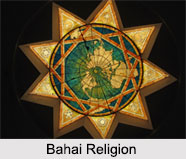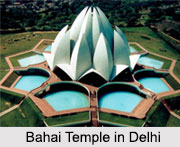 Baha"i is a religion that was founded in Iran in the middle of 19th century by Mirza Hoseyn Ali Nuri. He is known as Baha"Ullah which means "The Glory of God" in Arabic. The main theme of Baha"i belief is that Baha"Ullah and his forerunner, who was known as the "Bab", were manifestations of God, who in his essence is unknowable.
Baha"i is a religion that was founded in Iran in the middle of 19th century by Mirza Hoseyn Ali Nuri. He is known as Baha"Ullah which means "The Glory of God" in Arabic. The main theme of Baha"i belief is that Baha"Ullah and his forerunner, who was known as the "Bab", were manifestations of God, who in his essence is unknowable.
The Baha"i Faith has existed in India since the mid 1800s. It is one of the longest standing and most respected Baha"i National communities in the world. The Lotus Temple near New Delhi is a place for private prayer and meditation for persons of Baha"i faiths. A number of Parsis were converted to the Baha"i Faith. The Baha"i Faith has been growing in India and is widely respected.
Origin of Baha"i Religion
The Baha"i religion originally grew out of the Babi faith, or sect, which was founded in 1844 by Mirza Ali Mohammad of Shiraz in Iran. He proclaimed a spiritual doctrine emphasizing the forthcoming appearance of a new prophet or messenger of God who would overturn old beliefs and customs and usher in a new era.
 Theme of Baha"i Religion
Theme of Baha"i Religion
The principal theme of Baha"i is the unity of all religions and the unity of humanity. The Baha"i religion states that all the religions in the world though apparently different, have an identical truth. A peculiar function of Baha"Ullah was to overcome the disunity of religions and establish a universal faith.
Faith of Baha"i Religion
The Baha"i Faith emphasizes unity, non-violence, tolerance, respect and recognition of the major religions of the world, including Hinduism and Buddhism. Baha"i community believe that all the founders of the world"s great religions have been manifestations of God and agents of a progressive divine plan for the education of the human race. They believe in the oneness of humanity and devote themselves to the abolition of racial, class and religious prejudices. The great bulk of Baha"i teachings are concerned with social ethics, the faith has no priesthood and does not observe ritual forms in its worship.
The Baha"i Faith is a contemporary religious movement evolving from the Babi movement, which spread throughout Iran and Iraq in the mid 19th century. The Baha"i Faith has slowly moved beyond and thereby established itself as an independent religion.




















